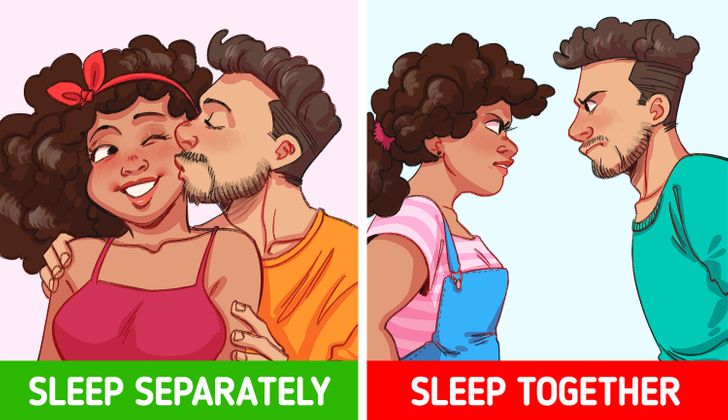According to a survey, only 14% of couples sleep in separate beds every night. And while many of us might believe in the saying “couples who sleep apart grow apart” there are studies that show the opposite is actually true.
We at Bright Side believe that there are no wrong or right sleep arrangements, because to some, sleeping in different beds can be as pleasing as for others sharing a bed with their partner.
A poor night’s sleep can turn lovers into fighters.

According to research, sharing a bed with a partner that has restless sleep behavior can deprive you of 49 minutes of sleep each night. And, when one partner doesn’t get a proper night’s sleep because of the other, it will most likely result in a conflict between them the next day.
Actually, the study even confirmed that couples who tend to have a poor night’s sleep have more severe and more frequent fights than those who wake up well-rested. People who get a good night’s sleep, on the other hand, are more likely to be in a good mood, have lower stress levels, and be more patient.
Resenting your partner because you can’t get a good night’s sleep can be destructive to the relationship.

Snoring, fidgeting, and bed or blanket hogging are just a few of many reasons why some couples choose to sleep in different beds or even in different bedrooms. Lying awake listening to your partner snoring while you beat yourself up to fall asleep can lead to a build-up of anger, tension, and resentment toward your partner.
According to Jennifer Adams, author of Sleeping Apart Not Falling Apart, sleeping in a separate bedroom can even help a relationship thrive because both partners are not sleep deprived.
Each partner can tailor their sleeping conditions to their heart’s content.

Tina Cooper, a licensed social worker, sleeps in different bedrooms with her partner because of their opposite sleeping habits. “I’m a night owl, he’s an early bird. I need soothing sounds to fall asleep, and he likes silence. He likes a hard mattress, and I like soft and full of pillows. And because I don’t like the early day’s sunlight, my boyfriend gave me the master bedroom which gets less light and he has the second largest room that gets the sunrise he loves.”

How you spend the nighttime in your shared bedroom with your partner can also influence your daytime functioning, marital satisfaction, and psychological and physical health. And when 2 people with different bedtime preferences and nighttime schedules end up together, changing themselves just to please their partner’s needs might harm their relationship in the long run.
Sleeping in different bedrooms with your partner means that the 2 of you will have a place just for yourselves where you can relax after an exhausting day. This way, both of you can satisfy your needs without tiptoeing around and worrying about whether your partner might wake up because you want to watch the latest episode of your show before bed.
Even if you don’t remember waking up, disturbed sleep can have a negative impact on your overall health.

During the night, our brain cycles through the stages of sleep several times: light sleep, deep sleep, and REM (Rapid eye movement sleep). But when you interrupt the cycle by waking up during the night, it means that your brain spends more time in the light sleep stage and misses out on REM. And without sufficient REM your emotional well-being and cognitive performance suffer.
Interrupted sleep can also have short and long-term health consequences, like hypertension, weight-related issues, mental health problems, reduced quality of life, and other health-related issues.
People on Reddit share why they decided to sleep separately with their partner.

- “Because a good night’s sleep is more romantic than sharing a bed. I snore and toss and turn. He gives off literal village levels of heat in his sleep and I can’t stand the heat. I read, he can’t stand light. We keep different hours to an extent. A million reasons. We get along so much better this way.” — crankyweasels
- “My partner and I have completely separate bedrooms. We ’sleepover’ occasionally in each other’s rooms. However, we both sleep exponentially better apart. He’s a night owl and I’m an early bird. He wants only one sheet on him, I want 10 lbs of blankets. In addition, having a separate room allows me to decorate it however I want, have my own personal space, and keep it to the level of cleanliness I prefer. People look at us sideways when I mention the separate rooms thing, but it’s been a game-changer.” — eriasana
- “Different sleep cycles due to different work schedules. We are still madly in love and we both agreed to this because it’s the best for both of us.” — AFishInATank
- “Early in our relationship, 90% of our fights occurred in the bedroom. I like to sleep in a cold room with the fan on and white noise like a box fan. I also like to go to sleep with the TV on. She likes to sleep in a warm, still, cave in complete silence and darkness. We started sleeping in separate rooms and all of a sudden 90% of our fights stopped. Also, because we were getting real sleep, other fights turned more into heated discussions.” — ttc8420
What are your sleeping arrangements with your partner? Do you believe sleeping in different beds can help a relationship thrive?
Crucial Techniques for Preventing Infections in Your Eyes
As essential sensory organs, our eyes enable us to see and understand the world around us. Preserving our eyes against dangerous diseases and infections is a crucial part of keeping them in optimal health and maintaining our eyesight.

Many things, such as bacteria, viruses, allergies, and poor eye care techniques, can result in eye infections. We’ll look at a few key tactics in this post that can help you avoid eye infections and keep your vision intact for years to come.
- Frequent Handwashing: One of the best defenses against eye infections is keeping your hands clean. To get rid of dangerous bacteria and viruses, properly wash your hands with soap and water before handling contact lenses or touching your eyes.
- Avoid Eye Touching: Several surfaces that come into contact with our hands could be home to dangerous microbes. Avoid unnecessary eye touching or rubbing, as it can introduce bacteria and irritants, potentially leading to infections or worsening existing ones.
- Proper Contact Lens Care: Follow your eye doctor’s instructions on proper cleanliness if you wear contact lenses. Unless your eye care specialist instructs you otherwise, clean and sanitize your lenses on a regular basis, replace them when necessary, and refrain from sleeping with them on.
- Eyewear Hygiene: If your glasses or sunglasses come into touch with dust, debris, or bacteria, make sure they are cleaned and sanitized on a regular basis to avoid transferring these elements to your eyes.
- Personal Eye Makeup: By dispersing bacteria and viruses, sharing eye makeup products with others raises the risk of eye infections. Avoid borrowing or lending eyeliner, mascara, or eye shadow, and replace your eye makeup regularly to prevent the buildup of harmful microorganisms.
- Protection in Polluted Environments: Use the proper goggles or eye protection if you reside in or are exposed to extremely polluted environments with irritants like smoke, dust, or chemicals to reduce the risk of injury to your eyes.
- Allergy Awareness:Avoid rubbing your eyes if you are prone to allergies brought on by pollen or pet dander and use over-the-counter or prescription antihistamine eye drops to relieve symptoms.
- Maintain a Healthy Lifestyle: Maintaining optimal eye health requires a diet rich in important vitamins and minerals, especially vitamin A, and well-balanced. Include items like salmon, citrus fruits, carrots, and spinach in your diet. In addition to hydrating your eyes, maintaining adequate hydration lowers your chance of developing dry eye infections.
- Regular Eye Exams: Early detection and prevention of eye infections and other eye-related issues require routine eye exams by optometrists or ophthalmologists. These experts are capable of spotting possible issues and offering insightful advice to protect the health of your eyes.
- Give Your Eyes a Break: To reduce eye fatigue caused by prolonged screen time, follow the 20-20-20 rule—every 20 minutes, look at something 20 feet away for 20 seconds. This easy routine can assist in lowering the incidence of eye infections.

In conclusion, you can successfully prevent infections in your eyes by implementing these simple procedures into your everyday routine. You may preserve clean, clear eyesight by doing frequent eye exams, paying attention to eye care products, and emphasizing excellent cleanliness. To preserve your vision and enjoy the world’s beauty with healthy eyes, always remember that prevention is always better to treatment.



Leave a Reply